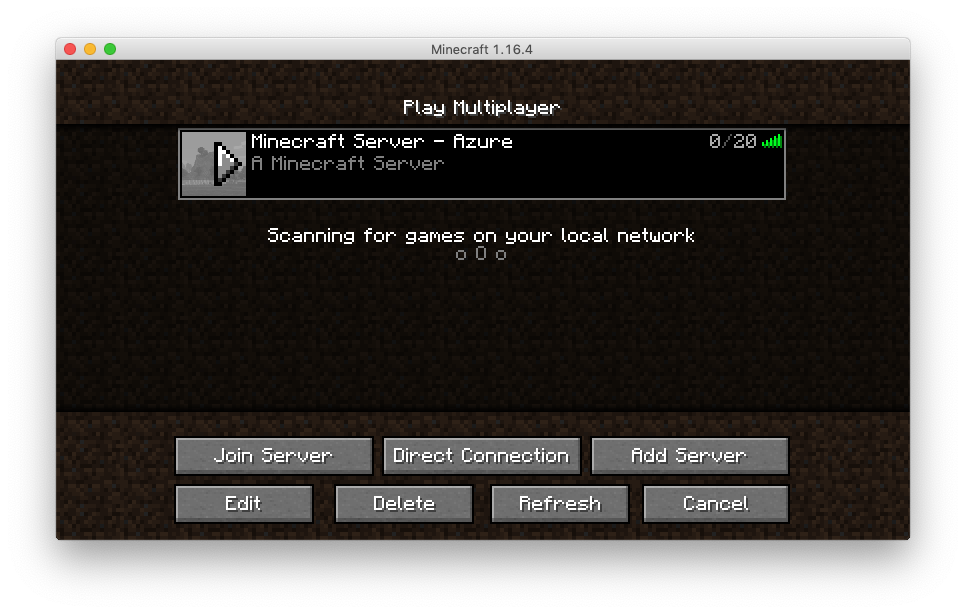Minecraft Server Using an Azure Virtual Machine
This example deploys an Azure Virtual Machine and provisions a Minecraft server.
Prerequisites
Deploying and running the program
Create a new stack:
$ pulumi stack init devCreate a Python virtualenv, activate it, and install dependencies:
This installs the dependent packages needed for our Pulumi program.
$ python3 -m venv venv $ source venv/bin/activate $ pip3 install -r requirements.txtNext, generate an OpenSSH keypair for use with your server.
$ ssh-keygen -t rsa -f rsa -b 4096 -m PEMThis will output two files,
rsaandrsa.pub, in the current directory. Be sure not to commit these files!We must configure our stack and make the public key and private available to the virtual machine. The private key is used for subsequent SCP and SSH steps that will configure our server after it is stood up.
$ cat rsa.pub | pulumi config set publicKey -- $ cat rsa | pulumi config set privateKey --secret --Notice that we’ve used
--secretforprivateKey. This ensures the private key is stored as an encrypted Pulumi secret.Set the required configuration for this example. This example requires you to supply a username, password, location, and the public and private keys to the virtual machine that we are going to create. Check the Azure virtual machine password requirements before creating a password.
$ pulumi config set admin_password --secret <admin password> $ pulumi config set admin_username <admin username> $ pulumi config set azure-native:location westus # any valid Azure region will doNote that
--secretensures your password is encrypted safely.Run
pulumi upto preview and deploy the changes:$ pulumi up Previewing update (dev) View Live: https://app.pulumi.com/spara/azure-py-webserver/dev/previews/19ff86d5-9303-4f53-a1ae-d0882a59e9a9 Type Name Plan + pulumi:pulumi:Stack azure-py-webserver-dev create + ├─ azure-native:resources:ResourceGroup server-rg create + ├─ azure-native:network:PublicIPAddress server-ip create + ├─ azure-native:network:VirtualNetwork server-network create + ├─ azure-native:network:NetworkInterface server-nic create + ├─ azure-native:compute:VirtualMachine server-vm create + ├─ pulumi-python:dynamic:Resource config create + └─ pulumi-python:dynamic:Resource install create Resources: + 8 to create Do you want to perform this update? yes Updating (dev) View Live: https://app.pulumi.com/spara/azure-py-webserver/dev/updates/40 Type Name Status Info + pulumi:pulumi:Stack azure-py-webserver-dev created 1 message + ├─ azure-native:resources:ResourceGroup server-rg created + ├─ azure-native:network:VirtualNetwork server-network created + ├─ azure-native:network:PublicIPAddress server-ip created + ├─ azure-native:network:NetworkInterface server-nic created + ├─ azure-native:compute:VirtualMachine server-vm created + ├─ pulumi-python:dynamic:Resource config created + └─ pulumi-python:dynamic:Resource install created Diagnostics: Outputs: Minecraft Server IP Address: "40.112.182.143" Resources: + 8 created Duration: 7m6sGet the IP address of the newly-created instance from the stack’s outputs:
$ pulumi stack output public_ip 40.112.182.143Check to see that your server is running by adding the server to the Minecraft client.

Destroy the stack:
$ pulumi destroy Previewing destroy (dev) View Live: https://app.pulumi.com/spara/azure-py-webserver/dev/previews/2544442c-ddd7-44cc-a633-2a5fed28dafb Type Name Plan - pulumi:pulumi:Stack azure-py-webserver-dev delete - ├─ pulumi-python:dynamic:Resource install delete - ├─ pulumi-python:dynamic:Resource config delete - ├─ azure-native:compute:VirtualMachine server-vm delete - ├─ azure-native:network:NetworkInterface server-nic delete - ├─ azure-native:network:PublicIPAddress server-ip delete - ├─ azure-native:network:VirtualNetwork server-network delete - └─ azure-native:resources:ResourceGroup server-rg delete Outputs: - Minecraft Server IP Address: "40.112.182.143" Resources: - 8 to delete Do you want to perform this destroy? yes Destroying (dev) View Live: https://app.pulumi.com/spara/azure-py-webserver/dev/updates/41 Type Name Status - pulumi:pulumi:Stack azure-py-webserver-dev deleted - ├─ pulumi-python:dynamic:Resource install deleted - ├─ pulumi-python:dynamic:Resource config deleted - ├─ azure-native:compute:VirtualMachine server-vm deleted - ├─ azure-native:network:NetworkInterface server-nic deleted - ├─ azure-native:network:PublicIPAddress server-ip deleted - ├─ azure-native:network:VirtualNetwork server-network deleted - └─ azure-native:resources:ResourceGroup server-rg deleted Outputs: - Minecraft Server IP Address: "40.112.182.143" Resources: - 8 deleted Duration: 4m33s